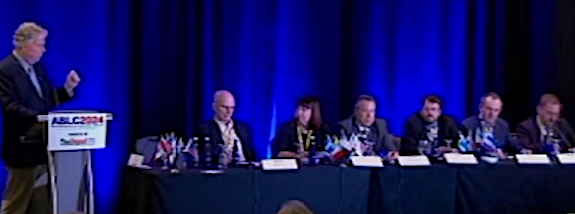Get Funded! Avoid the Top 3 Mistakes in Raising Bioeconomy Capital
By Steve Weiss, co-founder of Grey Heron, and long-time member of the Due Diligence Wolfpack*
Capital is the fuel for building your business – and you can get it, just like you keep achieving milestones and adding partners. But fundraising is often harder, longer and more uncertain than you’d like – and you don’t want unnecessary missteps. So take it from a Wolf* – the ones hired to evaluate investments: here’s how to avoid common mistakes in fundraising, partnerships and messaging, that you can apply to your investor presentations, customer presentations and website.

The Wolfpack in action, March 2024. Left to right, Jim Lane, David Dodds, Henna Poikolainen, James Iademarco, Steve Slome, Steve Weiss, Dave Collings. Not on-stage this time: Joel Stone, Michele Rubino, Paul Bryan, Sam Nejame. !
Mistake #1: ‘buzzword-itis’
Or… say what you actually do.
One of the first things Wolves tear into is grandiose generalities and buzzwords: “we’re on a mission to save the planet through more sustainable blah-blah-blah with giant markets and a maximally-efficient process, and…”. We’ve seen companies claiming to solve the world’s greenhouse gas issues, but that target small markets; ‘bioplastics’ firms that claim they’re not plastic (but don’t say what they do make); etc. You get the picture.
“I couldn’t get over their website,” said Henna Poikolainen, a recent addition to the Wolfpack, about one of these firms. “The single densest concentration of buzzwords I have ever seen,” said another.
When you hide behind buzzwords and generalities, people’s eyes glaze over and you lose credibility. And you’re definitely not differentiating yourself from the 50 other companies using the same buzzwords. That’s taking a couple steps down the road to failure.
It’s not just me that thinks this way. In a first-ever ‘audience participation’ feature during a Wolfpack session, an avalanche of people raised their hands when I asked “how many people here are tired of seeing websites that are preachy, full of buzzwords, don’t tell you what they actually do, and leave you confused before you’ve even started?”

Weiss asking for a show of hands.
The solution is easy: skip the buzzwords and generalities; use plain language to say what you actually do. And then…
Mistake #2: ‘hype-steria’
Or… avoid hype; be real; be specific.
Lots of companies that have come under my Wolf-gaze gloss over their actual results (and/or their not-yet-achieved list). Are they at pilot? Demo? How big is that, anyhow? Are they using the waste feedstock that their story is built around, or still using sugar? Have they used their vaunted bio-process technology to make their sample materials, or do you have to read a footnote to learn that they produced it using chemical processing techniques (anyone want to guess the company here)? Are those offtake agreements real, and substantial?
When you wave your arms about your results, or exaggerate them, you lose credibility – big time. And even if someone buys it at first, the facts will catch up to you.
Don’t be shy. Specificity is your friend, and builds credibility. Numbers, names and timelines are good.
Remember that the details will need to come out in your business discussions anyhow – so skip the fake it till you make it.
Mistake #3: ‘techno-philiosis’
Or… talk about your business, not just your technology – and it better make sense.
With rare exceptions, investors (especially mid- and late-stage ones) are investing in your business, not in your technology. The technology is a means to an end – something that lets you solve a real problem better than other approaches, delivered in a way people will pay for.
Company after company overdoes it in talking tech; and underdoes it when it comes to describing who will buy their product and why. Please flip that relative priority.
You need to be able to show some serious homework and results with respect to your beachhead opportunities and how you expand from there.
Your business also needs to pass some common-sense sniff tests. For example: does your process seem like it might have high capital costs, but you’re highlighting low-value applications (we just saw an example of this in a company focused on packaging)? Or, are you taking into account how everyday consumers will view your products? For example, as Wolf Steve Slome said, “does anyone really want a drinking straw made from wastewater?” (Yuck.)
More help: articles and videos on strategy, fundraising and more
For a deeper dive on these topics, check out some of the articles and videos below – and happy company-building!
Above: some of the articles and videos on fundraising, offtake agreements, messaging and partnerships at the Grey Heron website.
*The Due Diligence Wolfpack was started years ago by Jim Lane (see example recording), and is featured on Digest TV, at the ABLC conferences and on webinars. Per Jim, we “devour hype, in search of value.” I’ve had great fun ‘critiquing’ over 40 companies and technologies to date.
Steve Weiss is co-founder of Grey Heron, a management and strategic marketing consulting firm. Since 1993, the firm has helped executives and investors at over 140 companies build value and become leaders in their sector, through strategy, fundraising, positioning and partnerships. Fields include climatetech, food, advanced materials, and cloud/SaaS/AI. Within renewable chemicals, materials and fuels, Steve has helped build Future Origins, Genomatica (aka Geno), Oberon Fuels, NovoNutrients, Beta Renewables and Liquid Light (acquired by Avantium), and is a proud member of the Due Diligence Wolfpack (watch our sessions on plastics and packaging, carbon capture, use and sequestration, and pivots). Contact Steve at weiss@greyheron.com; see Steve’s LinkedIn profile; listen to his “Science of Yes: Positioning and Messaging for Success”.
Category: Thought Leadership, Top Stories















